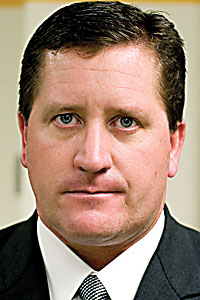Intercollegiate football offers many challenges to student-athletes

Bart A. Tatum – Head Football Coach
The stated purposes of the undergraduate experience are varied. Ultimately, most missions in higher education state preparation as a key outcome. Undergraduate preparation could be defined as the transition into adulthood. There is a transition of accountability. Responsibilities are much more numerous and concentrated. Students are spread out more and involved in many more activities and academic subject areas. Another transition involves motivation. College students experience lower levels of extrinsic motivation.
Parents, teachers and other supervisory types are less accessible and provide significantly less contact time during the undergraduate experience. Students are supervised, but there is a definite need for intrinsic motivation.
One of the activities offered at some higher education institutions is intercollegiate football. In ideal scenarios, football student-athletes accept the challenges of transition and learn values of preparation. Accountability will be a measured outcome of our intercollegiate football program. It is very tempting to lead our student-athletes around by the hand. This is the path of least resistance, however. Mishaps and outright failures can be valuable learning experiences. How many strength and conditioning sessions will our players miss this spring? How many team, unit or position meetings will be disrupted by tardy student-athletes? How many prime opportunities to grow stronger, faster and more explosive will be missed because of fatigue or insufficient levels of physical and mental toughness?
Our coaches will observe, document and evaluate answers to these and related questions and provide honest and candid feedback to the team. Parallels will be drawn from intercollegiate football experience to future experiences related to family or employment. For example, behaviors and attitudes will be identified that lead to wage increases, better job status, more benefits or a happy and productive family life.
Other behaviors and attitudes will be identified that get you fired or divorced.
Intrinsic motivation will be another measured outcome of our program. As is necessary, particularly at younger ages, the motivation to do right is often extrinsic.
The transition of motivational needs is pivotal to the development of a responsible adult. Functional, productive adults do right significantly more often for the sake of doing right. The motivation is intrinsic.
However, college is a time of transition.
Consequently, there is significant variation in levels of intrinsic motivation among most groups of student-athletes.
My experiences have been that the more intrinsically motivated players there are, the more productive the team will be. If a student-athlete joins our program with extensive needs motivationally, we will surround him with intrinsically motivated individuals.
We will observe, document and measure how often players have to be told (motivated) to act like a champion. We will also measure how often players act like a champion simply because it is appropriate.
Our players will understand prospective employers prefer not to hire motivational liabilities. Prospective employers prefer highly motivated motivators.
Your donation will support the student journalists of Missouri Southern State University. Your contribution will allow us to purchase equipment and cover our annual website hosting costs.















